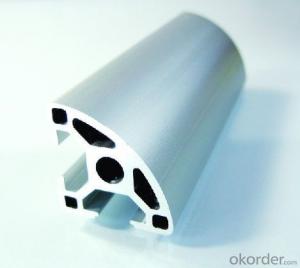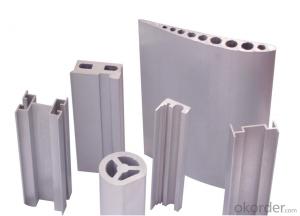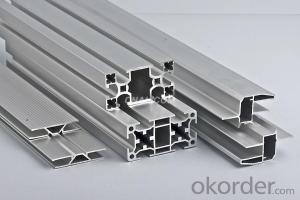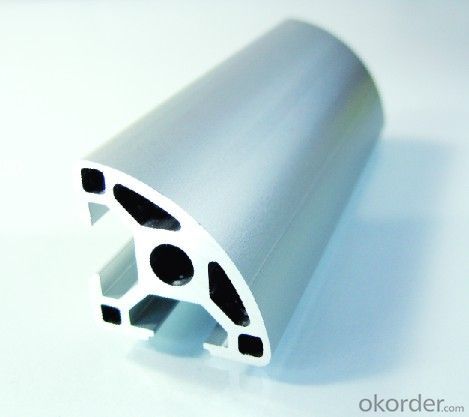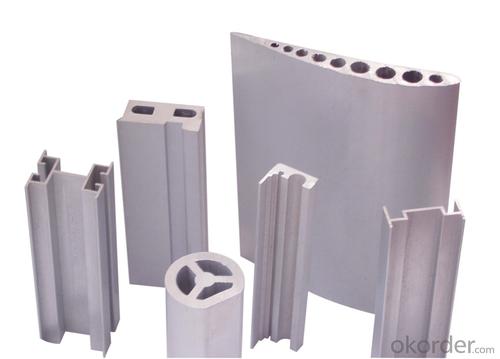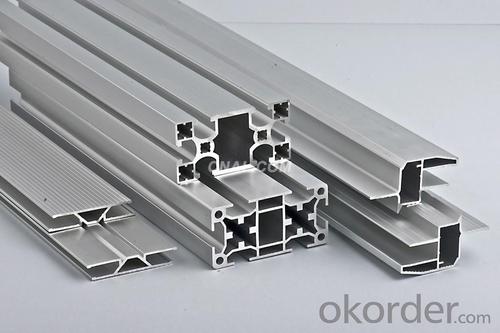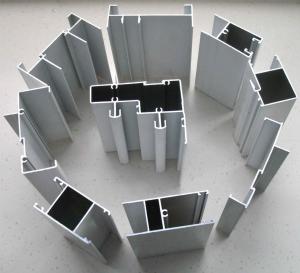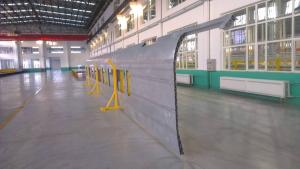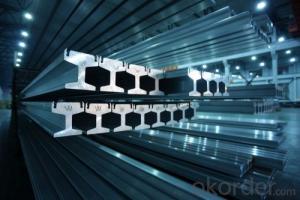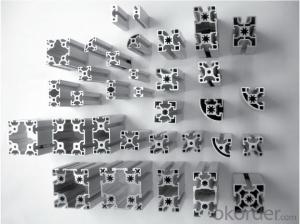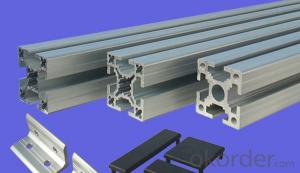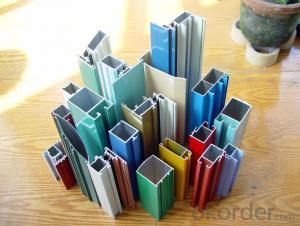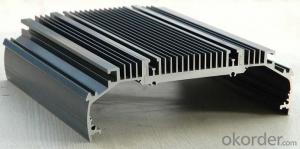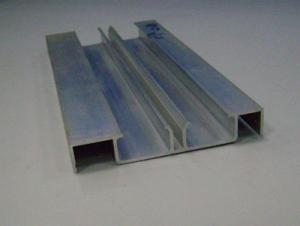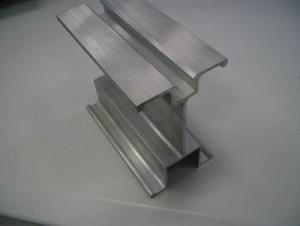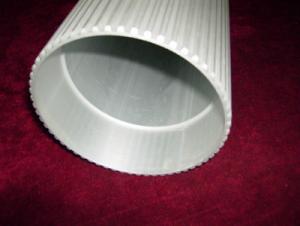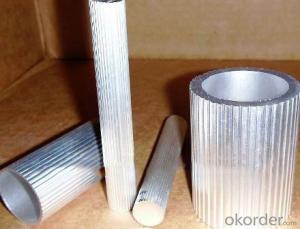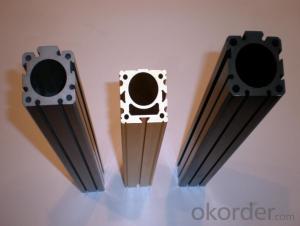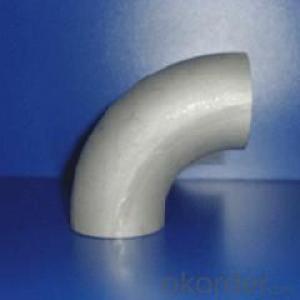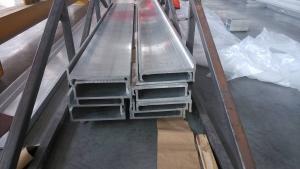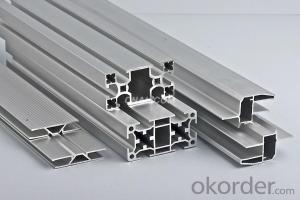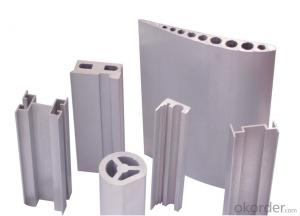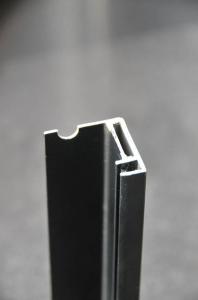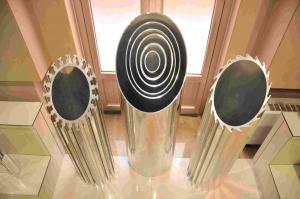Aluminum Extrusion Profiles Uk - Architectural Aluminium Profile Extrusion
OKorder Service Pledge
OKorder Financial Service
You Might Also Like
Aluminium is a relatively soft, durable, lightweight, ductileand malleablemetalwith appearance ranging from silvery to dull gray, depending on the surfaceroughness. It is nonmagnetic and does not easily ignite. A fresh film ofaluminium serves as a good reflector (approximately 92%) of visible lightand an excellent reflector (as much as 98%) of medium and far infraredradiation. The yield strength of pure aluminium is 7–11 MPa,while aluminium alloys have yield strengths ranging from200 MPa to 600 MPa. Aluminium has about one-third the densityand stiffness of steel. It is easily machined,cast, drawn and extruded.
Features:
Material | Alloy 6063,6061,6005or according to customer’s choice |
Temper | T3, T4, T5, T6 |
Surface | Anodize, electrophoresis, powder coating, PVDF coating, wood grain painting, matted, etc. |
Length | Coating 6.5 meters, Anodizing 6.5 meters, Mill finish 5 meters |
Application | Industrial, electrical equipment(TV set, air conditioner, refrigerator, computer), decoration,construction, transportation |
Custom Made | We can package following with customer's request. |
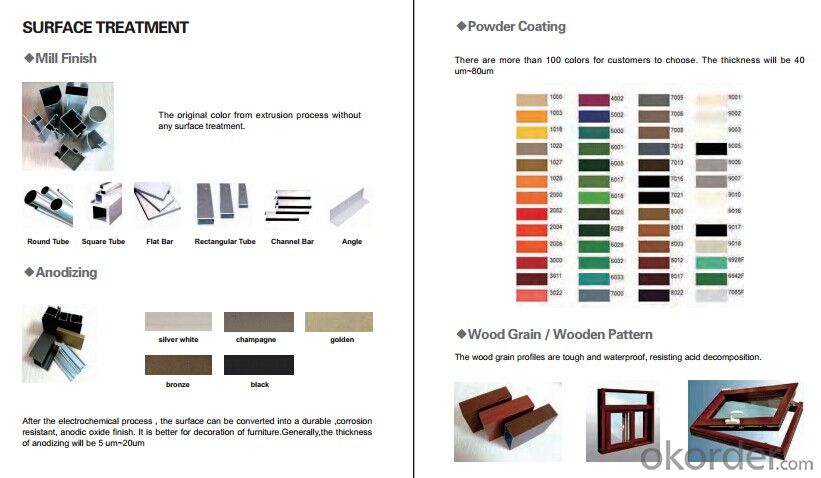
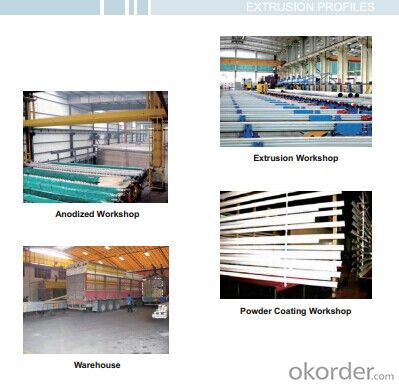
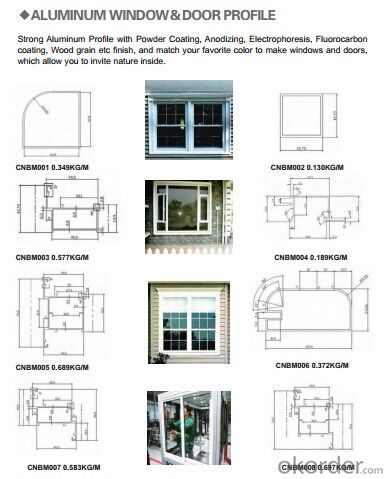
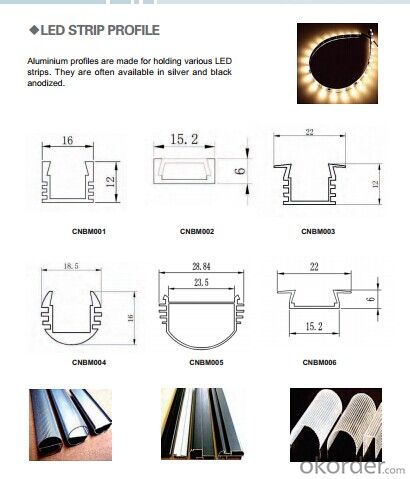
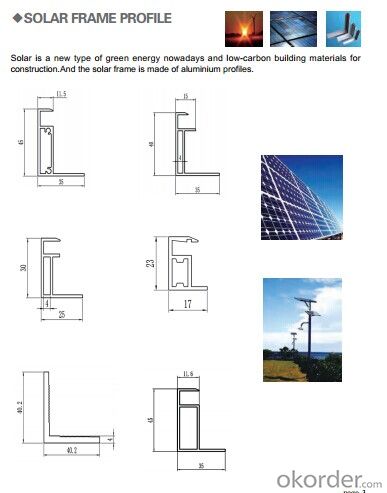
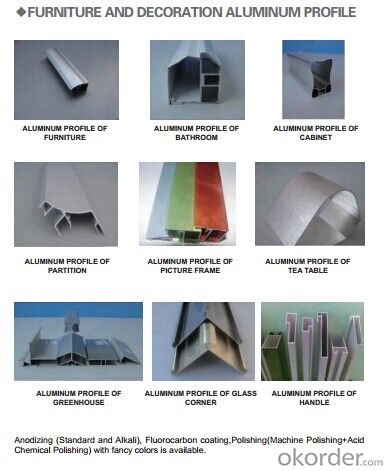
- Q: Can someone give me a direction? Thank you
- First of all, the country's biggest industrial enterprise profile Liaoning Zhongwang Liaoyuan Midas Shandong Shandong Hunan Guangxi South Nanshan jungle Sheng Tong Guangdong Luxe Guangdong and the United States they have or will soon be launched high-speed EMU industrial aluminum productsSecondly, the radiator done the best Guangxi south south aluminum, but the radiator specification too, radiator section do few enterprises, the majority of enterprises in the decentralized radiator, small cross section, you have to search.The best solar energy company is Jiangsu's Hyde aluminum, energy aluminum enterprises concentrated in Jiangsu and Zhejiang, it is recommended search.Mechanical equipment is divided into manufacturing machinery and medical equipment manufacturing machinery, aluminum is not much, much maintenance need new materials will purchase, medical devices are mostly aluminum fittings and seamless pipe, little section, which can satisfy the production enterprises can do.Transport can be divided into passenger cars and commercial vehicles in two categories, now on the domestic market of aluminum on the vehicle in popularity is also very slow, promotion is difficult, this is not a salesman to project, to promote the use of a wide range of industry to the understanding, or executive strategy, and promote the country policy......The one or two sentence that is not clear, industry market is still relatively confused, capacity is already saturated, according to the perspective of industrial development, 120% saturated, is conducive to healthy competition, eliminating inferior enterprises, promote the development of technology, but has been more than 150% saturated capacity in China, most are small extrusion machine for the production of building, 70% how to develop materials, industry, still have to see your company's positioning and strategic development.
- Q: This question asks if aluminum profiles can be utilized in cold weather conditions and seeks an explanation for their suitability.
- <p>Yes, aluminum profiles can be used in cold climates. Aluminum is a lightweight and durable material that maintains its strength and structural integrity even in extreme low temperatures. It does not rust or corrode, which makes it ideal for use in environments with harsh weather conditions. Additionally, aluminum has good thermal conductivity, which allows it to dissipate heat effectively, but it also has low thermal expansion, meaning it does not expand or contract significantly with temperature changes. This characteristic helps prevent warping or cracking in cold climates. Properly designed and installed aluminum profiles can withstand the challenges of cold weather without compromising their performance or longevity.</p>
- Q: What are the advantages of utilizing aluminum profiles in construction projects in terms of environmental impact?
- <p>Aluminum profiles in construction offer several environmental benefits. They are highly recyclable, which reduces waste and conserves natural resources. Aluminum is lightweight, reducing transportation emissions. It also has a high strength-to-weight ratio, allowing for more efficient use of materials. Additionally, aluminum has excellent thermal conductivity, which can contribute to energy efficiency in buildings. Furthermore, aluminum production technology has advanced to reduce energy consumption and emissions during the manufacturing process. Overall, the use of aluminum profiles can lead to more sustainable and environmentally friendly construction practices.</p>
- Q: What is wearing a heat insulation aluminum profile? What is pouring heat insulation aluminum profile?
- The strip process is made up of two heat insulation strips to connect the two inner and outer parts of the aluminum profile, thereby preventing the conduction of heat inside and outside the aluminum profile, and realizing the purpose of energy saving. According to incomplete statistical data, there are nearly 100 companies in China that adopt imported strip production equipment and domestic strip production equipment, and less than half of the total quantity is produced normally. Both the pouring process and the threading technology have good heat insulation performance, which are the development directions of the energy-saving aluminum alloy building materials. In this regard, the state has pointed out the necessity of developing the cold bridge with broken heat. And this year will be rolled out aluminum alloy insulation construction profiles national standards. The market for heat insulation and energy saving profiles will become clearer.
- Q: What are the different anodizing colors available for aluminum profiles?
- There are several different anodizing colors available for aluminum profiles, including clear, black, bronze, gold, and champagne.
- Q: This question asks for methods to ensure that the installation of aluminum profiles is both cost-effective and efficient.
- <p>To ensure the installation of aluminum profiles is cost-effective and efficient, follow these steps: 1) Plan carefully: Use accurate measurements and detailed plans to minimize waste and rework. 2) Use quality materials: Invest in high-quality aluminum profiles to reduce maintenance and replacement costs. 3) Employ skilled labor: Well-trained installers can complete the job faster and with fewer errors. 4) Optimize the installation process: Streamline the process to reduce time and labor costs. 5) Regular maintenance: Proper care and maintenance can extend the life of aluminum profiles, saving on replacement costs. 6) Compare suppliers: Shop around for the best prices and quality to minimize costs. 7) Use modular designs: Modular systems can be more efficient to install and easier to modify in the future.</p>
- Q: Can aluminum profiles be used in modular exhibition system manufacturing?
- Certainly! In the realm of manufacturing modular exhibition systems, aluminum profiles prove to be of great utility. Renowned for their lightweight and durable attributes, aluminum profiles become an ideal choice for the construction of modular exhibition systems. Their effortless handling and assembly facilitate swift and efficient installation and dismantling of exhibition booths. Moreover, the flexibility to customize and reconfigure aluminum profiles to cater to specific design preferences further enhances their versatility in the manufacturing of modular exhibition systems.
- Q: What are the different bending machines or tools used for aluminum profiles?
- Aluminum profiles can be shaped and angled using various bending machines and tools. These tools are designed to meet specific project requirements, manipulating the profiles in different ways. 1. For smaller aluminum profiles, the Manual Tube Bender is a hand-operated bending tool. It consists of a lever and a bending shoe, allowing for manual bending of the profile. 2. When dealing with larger and thicker aluminum profiles, the Hydraulic Tube Bender is equipped with hydraulic power. This machine offers greater precision and control, making it ideal for industrial applications. 3. The CNC Tube Bending Machine is a computer-controlled machine that combines hydraulic power and computer programming. With this machine, aluminum profiles can be accurately bent, making it suitable for high-volume production and intricate designs. 4. The Roll Bending Machine is specifically designed for bending aluminum profiles into curved shapes. It uses three rolls, with the profile passing through the middle roll while the other two rolls apply pressure to achieve the desired curve. 5. To bend aluminum profiles without deforming or collapsing the inner diameter, the Mandrel Bender is used. This tool utilizes a mandrel inserted into the profile to support the inner wall during the bending process. 6. The Rotary Draw Bender is a machine that produces accurate and repeatable bends in aluminum profiles. It uses bending dies and a rotating arm, commonly used for tubes and pipes, but can also be adapted for aluminum profiles. These bending machines and tools offer various levels of precision, control, and production capacity. Manufacturers and fabricators can select the most suitable option based on their specific needs and requirements.
- Q: Can aluminum profiles be used in the automotive industry?
- Indeed, the automotive industry can incorporate aluminum profiles. Lightweight, durable, and corrosion-resistant, these profiles prove ideal for a range of applications in this sector. Commonly employed in the production of car bodies, doors, hoods, and various structural components, aluminum profiles aid in diminishing the overall weight of vehicles. Consequently, this reduction bolsters fuel efficiency and enhances performance. Furthermore, the malleability of aluminum profiles permits effortless extrusion into intricate forms, offering greater design adaptability and innovative solutions in automotive manufacturing.
- Q: Are aluminum profiles suitable for interior design applications?
- Yes, aluminum profiles are suitable for interior design applications. Aluminum is a versatile material that offers many benefits for interior design purposes. Firstly, aluminum profiles are lightweight yet strong, making them easy to work with and install. This allows for flexibility in design and enables the creation of intricate shapes and structures. Secondly, aluminum is highly durable and resistant to rust and corrosion. This makes it suitable for use in various interior design applications, including door frames, window frames, partitions, cabinets, and furniture. Aluminum profiles can withstand wear and tear, ensuring longevity and minimal maintenance requirements. Additionally, aluminum profiles can be customized and finished in various ways. They can be powder-coated or anodized to achieve different colors and textures, allowing for design versatility and the creation of unique and aesthetically pleasing interiors. Furthermore, aluminum is a sustainable and environmentally friendly material. It is highly recyclable, and its production requires significantly less energy compared to other metals. This makes it a sustainable choice for interior design applications, aligning with the growing trend of eco-conscious design. In conclusion, aluminum profiles are indeed suitable for interior design applications. Their lightweight, durability, customization options, and sustainability make them an ideal choice for creating functional and visually appealing interiors.
Send your message to us
Aluminum Extrusion Profiles Uk - Architectural Aluminium Profile Extrusion
OKorder Service Pledge
OKorder Financial Service
Similar products
Hot products
Hot Searches
Related keywords
